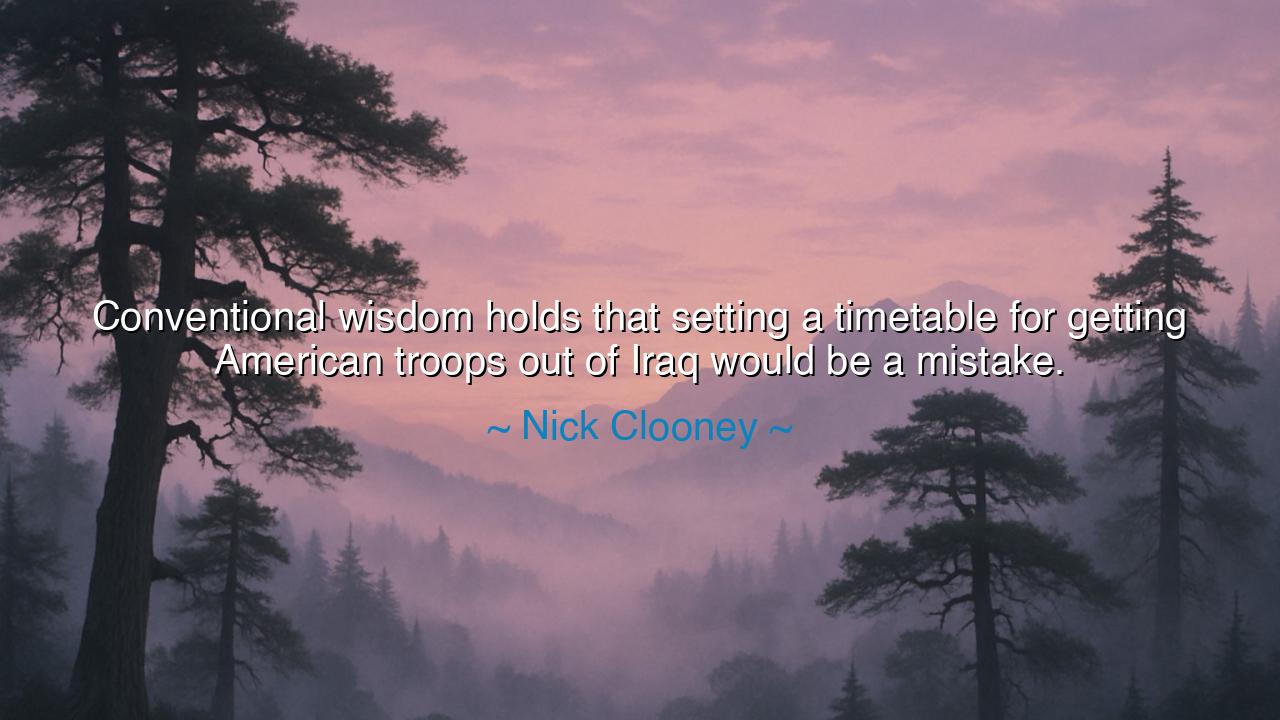
Conventional wisdom holds that setting a timetable for getting
Conventional wisdom holds that setting a timetable for getting American troops out of Iraq would be a mistake.






Nick Clooney, journalist and voice of sober reflection, declared: “Conventional wisdom holds that setting a timetable for getting American troops out of Iraq would be a mistake.” In these words he does not merely report, but reveals the weight of opinion that often governs nations in times of war. For conventional wisdom is the collective voice of the powerful, repeated until it seems immovable, even when time may prove it flawed.
The meaning is grave. In the turmoil of the Iraq War, many leaders and analysts insisted that to set a timetable for withdrawal would embolden enemies, weaken allies, and expose chaos. Such was the wisdom of the moment, declared again and again until it appeared beyond question. Yet Clooney’s phrasing carries a quiet distance, as if to remind us that what is called conventional is not always true. Often, it is the echo of fear and the shield of those unwilling to face change.
History gives us parallels. In the long war of Vietnam, leaders too clung to conventional wisdom, saying that a timetable for withdrawal would mean defeat, dishonor, and the spread of communism. Yet years of bloodshed revealed that the war could not be won by prolonging it, and the voices that once sounded certain were remembered as mistaken. What was once wisdom became folly in hindsight, showing how fragile the authority of such “conventional truths” can be.
Clooney’s statement reminds us that conventional wisdom often resists the discomfort of reality. To set an end, to name a date, is to admit that war has limits, that power cannot resolve all, that sacrifice must cease. Those who profit from prolongation cloak their interests in the mantle of prudence, declaring timetables to be mistakes. Yet the wisdom of history whispers otherwise: that clarity of purpose and the courage to end war are often truer guides than the inertia of endless conflict.
Therefore, let the seeker learn this: do not accept conventional wisdom unexamined. Question it, test it against truth, weigh it against the lessons of the past. For what all men say today may be what all men regret tomorrow. Clooney’s words, though born of the Iraq War, echo across the centuries: that the crowd’s judgment must never silence the quiet courage to seek another way, for the lives of nations and of men depend upon it.






GHThai gia huy
I interpret this as more than a political statement—it’s a comment on human nature. People tend to trust what feels familiar, even in complex moral situations like war. But does following conventional wisdom prevent us from acknowledging mistakes or learning from them? Maybe the question isn’t whether timetables are good or bad, but whether leaders are willing to face uncertainty. True wisdom might lie in questioning the very notion of ‘conventional.’
BBBong Bong
This quote reminds me how often ‘conventional wisdom’ becomes a shield for inaction. It makes me wonder who benefits when timetables are dismissed as mistakes. Is it the policymakers, the defense industry, or the soldiers on the ground? Sometimes the term feels like a way to discourage public debate. Shouldn’t wisdom evolve with circumstances instead of becoming a static justification for maintaining the status quo? That’s what troubles me most here.
PTPhuoc Tien
Reading this, I feel conflicted. There’s truth in the idea that rigid deadlines can endanger military operations, yet indefinite involvement can be just as damaging. What makes it so difficult to challenge conventional wisdom in matters of national security? Perhaps it’s because dissent is often framed as unpatriotic. I’d like to explore whether genuine wisdom lies in flexibility—knowing when to stay and when to leave—rather than clinging to one prevailing doctrine.
HHnguyen huy hoang
This line strikes me as a subtle critique of how authority shapes our understanding of what’s ‘reasonable.’ Conventional wisdom often feels safe, but it can also stifle creative or moral solutions. Should decisions about war depend more on moral clarity or on strategic consensus? Maybe setting a timetable isn’t about weakness—it’s about accountability. It makes me wonder how much of conventional wisdom is truly based on evidence rather than fear of change.
AVNguyen Phan Anh Vy
I find this statement thought-provoking because it highlights the tension between strategy and politics. On one hand, pulling out troops too soon could destabilize a region; on the other, an open-ended military presence breeds resentment and fatigue. Is conventional wisdom really wise in this case, or is it just a way of avoiding difficult decisions? I’d love to know whether Clooney is questioning that mindset or simply observing it.